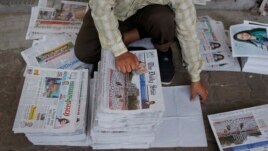19 August, 2017
Abdul Latif Morol's problems started after he wrote on social media about a dead goat.
Morol, a Bangladeshi journalist, had reported on a donation from a government official. The official had given a number of farm animals to a rural community southwest of Dhaka, the country's capital. One of the animals, a goat, had quickly died.
"Goat given by the state minister in the morning died in the evening," Morol wrote.

FILE - A Bangladeshi worker sorts newspapers, in Dhaka, Bangladesh, Feb. 20, 2016. Under Section 57 of Bangladesh's Information and Communications Technology Act, journalists can be jailed for offenses such as defamation or hurting religious sentiment.
A pro-government newspaper correspondent accused the journalist of insulting the official under Section 57 of Bangladesh's Information and Communications Technology Act.
Arrested two weeks ago, and later released on condition that he return for a hearing, Morol's case made news because of its strange nature.
His case puts light on the use of the law against Bangladeshi journalists and the shrinking space for media freedom in the country.
Journalists arrested under "Section 57" law
The Bangladeshi newspaper The Daily Star reports that at least 25 journalists have been accused of violating Section 57 since March 1. Violators can face a sentence of up to 14 years in prison.
Last month, the Editors' Council called for the law to be overturned.
Zafar Sobhan is with The Dhaka Tribune newspaper. He noted that "Section 57 of the ICT Act is a serious problem." However, he explained, even if the government cancelled the law, other measures could be used against the news media.
The goat story was "especially silly," Sobhan said. But he added, "it points to a fundamental problem: that no one knows what is within bounds and what is not."
Iftekhar Zaman, the head of Transparency International Bangladesh, said the law went against constitutional guarantees and international calls for freedom of expression.
Zaman noted that history has many examples of "how such controls of fundamental freedoms turn out to be counterproductive in the long run for the proponents of such."
Rights agencies criticize Bangladesh
Amnesty International documented the difficult environment for journalists three months ago in a report. The group noted incidents of harassment of reporters.
The restrictions are taking place at a time of rising Islamic fundamentalism. At least six writers and activists have been killed in Bangladesh since 2013.
In addition, rights groups point to reports of secret detentions and forced disappearances, some of them involving opposition members and activists. Last month, Human Rights Watch said there were 48 reported disappearances in the first five months of 2017.
Prime Minister Sheikh Hasina's government has generally dismissed criticism related to rights abuses and media restrictions. Last October, the prime minister reportedly said, "there is enough freedom for journalism in Bangladesh right now."
Last month, she defended Section 57 and warned against its misuse, saying it was not meant to be used against journalists. The Daily Star reported her statements.
But considered together, the problems facing Bangladesh suggest a shrinking democratic space. "Media freedom, freedom of speech, freedom of expression, there's a link to the state of democracy," said Badiul Majumdar, the Secretary of Citizens for Good Governance.
Sobhan, the Dhaka Tribune editor-in-chief, noted that his newspaper is critical of extremism, "but we have to be cautious." He said that some criticism of the government and law enforcement is acceptable, but "there are definitely lines one cannot cross."
"At the same time," he added, "one can't simply take the safe route, as then we would be doing our readers a disservice, and who would read such a newspaper, anyway?"
I'm John Russell.
Joe Freeman reported on this story for VOA News. John Russell adapted his report for Learning English. George Grow was the editor.
We want to hear from you. Write to us in the Comments Section.
_______________________________________________________________
Words in This Story
journalist – n. a reporter or other member of the news media
fundamental – adj. forming or relating to the most important part of something
silly – adj. showing a lack of understanding; not serious or meaningful
counterproductive – adj. not helpful : making the thing you want to happen less likely to happen
harassment – n. the act of annoying or bothering (someone) in a constant or repeated way